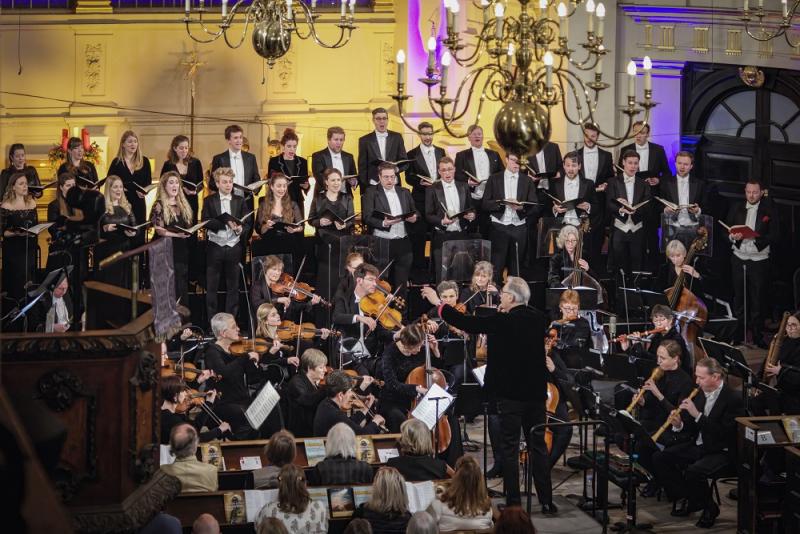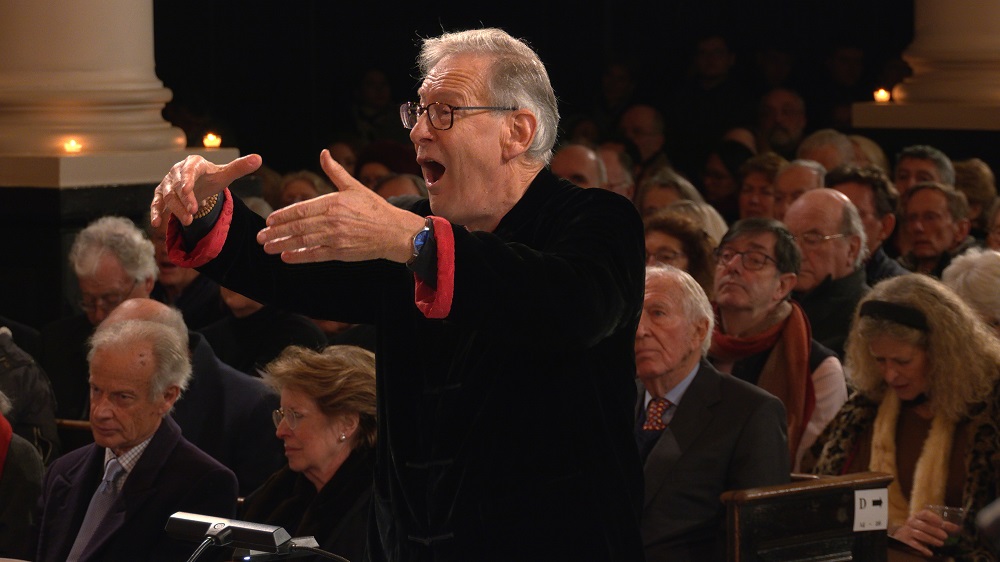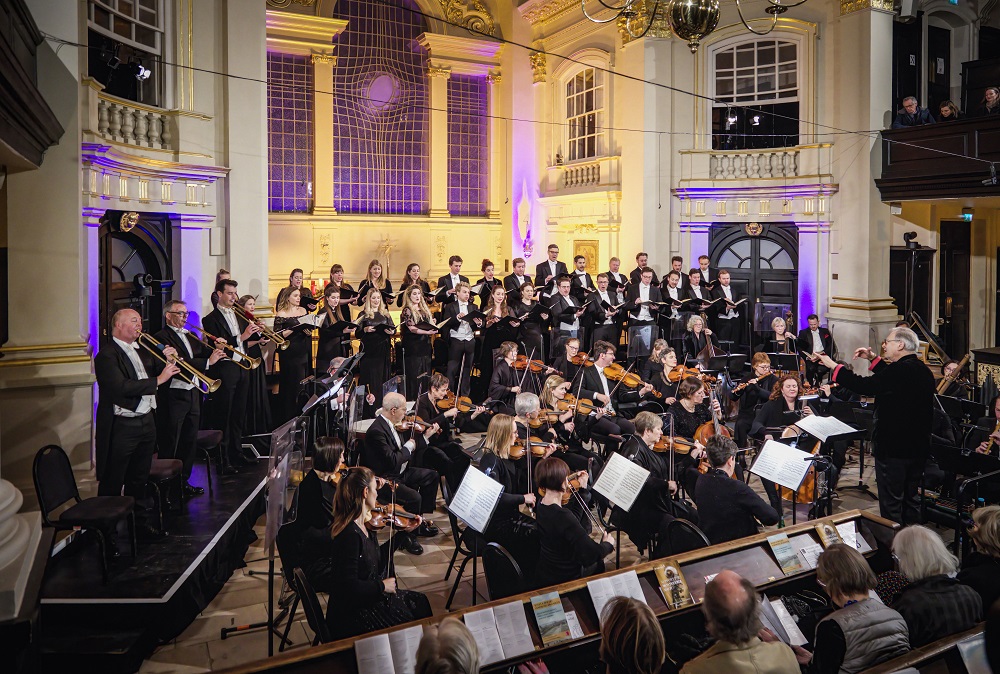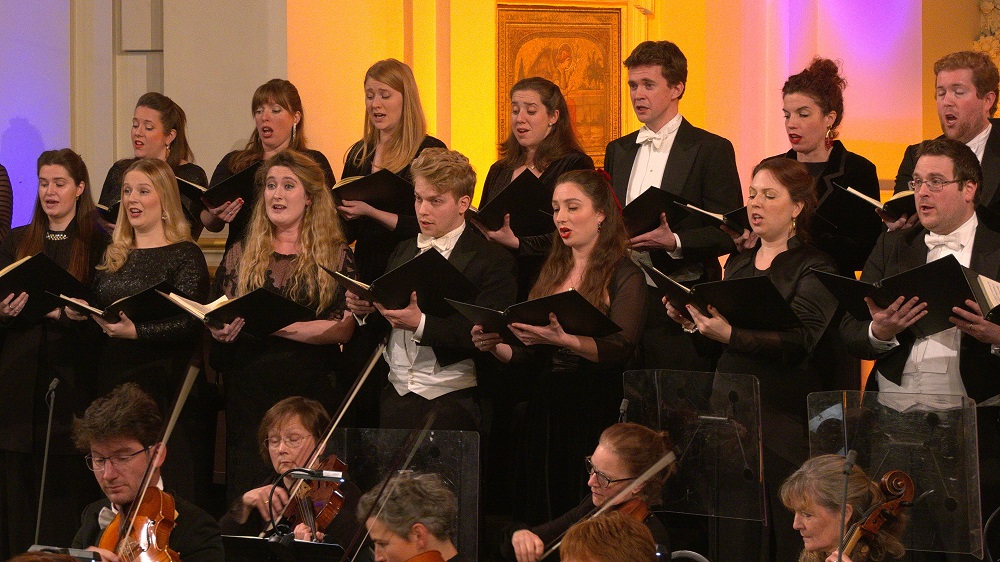Bach Christmas Oratorio, Monteverdi Choir, EBS, Gardiner, St Martin-in-the-Fields review - soul-piercing song and dance | reviews, news & interviews
Bach Christmas Oratorio, Monteverdi Choir, EBS, Gardiner, St Martin-in-the-Fields review - soul-piercing song and dance
Bach Christmas Oratorio, Monteverdi Choir, EBS, Gardiner, St Martin-in-the-Fields review - soul-piercing song and dance
The full genius of everything in all six cantatas over two glorious evenings

Across three and a half decades, John Eliot Gardiner’s 1987 recording of Bach’s Christmas Oratorio with his Monteverdi Choir and English Baroque Soloists spoiled one for live performances. Not that many of those weren’t equally fine and alive in different ways, but none I experienced gave us all six, equally glorious cantatas.
It could all be done in a single sitting – the whole is still shorter than Handel's Messiah – but on the London leg of their latest European tour, Gardiner and Co kept us waiting in rapt anticipation for Parts Four to Six between Tuesday and Thursday evenings.  The overall result was an embarrassment of riches. As in all his cantatas, Bach is ceaselessly resourceful not only about his combination of instruments and voices in each number, but about dramatic, which is to say operatic, pacing. Add to that the heart-lift which Gardiner’s ever-vigilant and nurturing style applies to song and dance, and you’re in heaven, and yes, Bach is God.
The overall result was an embarrassment of riches. As in all his cantatas, Bach is ceaselessly resourceful not only about his combination of instruments and voices in each number, but about dramatic, which is to say operatic, pacing. Add to that the heart-lift which Gardiner’s ever-vigilant and nurturing style applies to song and dance, and you’re in heaven, and yes, Bach is God.
Unleashing of sheer joy was careful. Gardiner avoided jubilant overkill in the glory of the opening chorus with three trumpets and timpani, “Jauchzet, frohlocket”, keeping it springy and light; the real blaze came in Part Two’s choral praise of God and, on the second evening, more of the same, but in utterly individual numbers, in Part Five’s rapturous opening chorus as well as the closing chorale of the entire event, with trumpeters Neil Brough, Michael Harrison and Sam Pierce, pictured below, having to excel in virtuosity even what had gone before (and succeeding with pure silver and gold. Then we got “Jauchzet, frohlocket” as last night’s encore).  How varied throughout are the colourings: performances which miss out Part Four save on having to pay two horn players, but in this case, who'd have wanted to miss Anneke Scott and Joseph Walters? And the shepherds' wind band led by oboes d'amore is a heartbreaking lovely presence in Part Two, starting with the most profound Pastoral Symphony ever written.
How varied throughout are the colourings: performances which miss out Part Four save on having to pay two horn players, but in this case, who'd have wanted to miss Anneke Scott and Joseph Walters? And the shepherds' wind band led by oboes d'amore is a heartbreaking lovely presence in Part Two, starting with the most profound Pastoral Symphony ever written.
Players and singers looked on in wonder and happiness when they were off duty, collegial in this as in the integration of obbligato instruments with solo voices. Marvellous instances would be too many to cite, but outstanding especially was the interchange of leader Kati Debretzeni and Hugh Cutting – the most exciting and multi-hued countertenor to have emerged very recently – in Part Three’s “Schiesse, mein Herz”, the interchanges of Hilary Cronin, one of the meatier sopranos in Gardiner’s ensemble, with oboist Michael Niesemann and their echo doubles in Part Four, and the elaborate duetting of Debretzeni and fellow front-desker Anne Schumann alongside tenor Nick Pritchard later in the same cantata. This was one of several instances where we needed more firepower from the singer, but Pritchard did make an exemplary and sensitive Evangelist throughout. (Cronin and Cutting within the chorus, third and fourth from left, pictured below).  It’s hard to believe that the last two numbers mentioned above were reworked from an earlier, secular cantata about Hercules, along with the sublime song of the Virgin to her child in Part Two (in its previous incarnation, Lust tries to lull the hero to sleep). You can’t say that the new music, the non “parody” material, is better, because it’s all miraculous, but there are special wonders in the chorale settings, and Gardiner made the only one performed here a cappella, as the three kings offer their gifts to the child, the still heart of the work, with rapt soft singing from the Monteverdis. They, and the players, ran the gamut of a masterpiece that deserves to stand alongside the Passions, but rarely does so in its entirety.
It’s hard to believe that the last two numbers mentioned above were reworked from an earlier, secular cantata about Hercules, along with the sublime song of the Virgin to her child in Part Two (in its previous incarnation, Lust tries to lull the hero to sleep). You can’t say that the new music, the non “parody” material, is better, because it’s all miraculous, but there are special wonders in the chorale settings, and Gardiner made the only one performed here a cappella, as the three kings offer their gifts to the child, the still heart of the work, with rapt soft singing from the Monteverdis. They, and the players, ran the gamut of a masterpiece that deserves to stand alongside the Passions, but rarely does so in its entirety.
rating
Explore topics
Share this article
Add comment
The future of Arts Journalism
You can stop theartsdesk.com closing!
We urgently need financing to survive. Our fundraising drive has thus far raised £49,000 but we need to reach £100,000 or we will be forced to close. Please contribute here: https://gofund.me/c3f6033d
And if you can forward this information to anyone who might assist, we’d be grateful.

Subscribe to theartsdesk.com
Thank you for continuing to read our work on theartsdesk.com. For unlimited access to every article in its entirety, including our archive of more than 15,000 pieces, we're asking for £5 per month or £40 per year. We feel it's a very good deal, and hope you do too.
To take a subscription now simply click here.
And if you're looking for that extra gift for a friend or family member, why not treat them to a theartsdesk.com gift subscription?
more Classical music
 Bizet in 150th anniversary year: rich and rare French offerings from Palazzetto Bru Zane
Specialists in French romantic music unveil a treasure trove both live and on disc
Bizet in 150th anniversary year: rich and rare French offerings from Palazzetto Bru Zane
Specialists in French romantic music unveil a treasure trove both live and on disc
 Scottish Chamber Orchestra, Ibragimova, Queen’s Hall, Edinburgh review - rarities, novelties and drumrolls
A pity the SCO didn't pick a better showcase for a shining guest artist
Scottish Chamber Orchestra, Ibragimova, Queen’s Hall, Edinburgh review - rarities, novelties and drumrolls
A pity the SCO didn't pick a better showcase for a shining guest artist
 Kilsby, Parkes, Sinfonia of London, Wilson, Barbican review - string things zing and sing in expert hands
British masterpieces for strings plus other-worldly tenor and horn - and a muscular rarity
Kilsby, Parkes, Sinfonia of London, Wilson, Barbican review - string things zing and sing in expert hands
British masterpieces for strings plus other-worldly tenor and horn - and a muscular rarity
 From Historical to Hip-Hop, Classically Black Music Festival, Kings Place review - a cluster of impressive stars for the future
From quasi-Mozartian elegance to the gritty humour of a kitchen inspection
From Historical to Hip-Hop, Classically Black Music Festival, Kings Place review - a cluster of impressive stars for the future
From quasi-Mozartian elegance to the gritty humour of a kitchen inspection
 Shibe, LSO, Adès, Barbican review - gaudy and glorious new music alongside serene Sibelius
Adès’s passion makes persuasive case for the music he loves, both new and old
Shibe, LSO, Adès, Barbican review - gaudy and glorious new music alongside serene Sibelius
Adès’s passion makes persuasive case for the music he loves, both new and old
 Anja Mittermüller, Richard Fu, Wigmore Hall review - a glorious hall debut
The Austrian mezzo shines - at the age of 22
Anja Mittermüller, Richard Fu, Wigmore Hall review - a glorious hall debut
The Austrian mezzo shines - at the age of 22
 First Person: clarinettist Oliver Pashley on the new horizons of The Hermes Experiment's latest album
Compositions by members of this unusual quartet feature for the first time
First Person: clarinettist Oliver Pashley on the new horizons of The Hermes Experiment's latest album
Compositions by members of this unusual quartet feature for the first time
 Gesualdo Passione, Les Arts Florissants, Amala Dior Company, Barbican review - inspired collaboration excavates the music's humanity
At times it was like watching an anarchic religious procession
Gesualdo Passione, Les Arts Florissants, Amala Dior Company, Barbican review - inspired collaboration excavates the music's humanity
At times it was like watching an anarchic religious procession
 Classical CDs: Camels, concrete and cabaret
An influential American composer's 90th birthday box, plus British piano concertos and a father-and-son duo
Classical CDs: Camels, concrete and cabaret
An influential American composer's 90th birthday box, plus British piano concertos and a father-and-son duo
 Cockerham, Manchester Camerata, Sheen, Martin Harris Centre, Manchester review - re-enacting the dawn of modernism
Two UK premieres added to three miniatures from a seminal event of January 1914
Cockerham, Manchester Camerata, Sheen, Martin Harris Centre, Manchester review - re-enacting the dawn of modernism
Two UK premieres added to three miniatures from a seminal event of January 1914
 Kempf, Brno Philharmonic, Davies, Bridgewater Hall, Manchester review - European tradition meets American jazz
Bouncing Czechs enjoy their Gershwin and Brubeck alongside Janáček and Dvořák
Kempf, Brno Philharmonic, Davies, Bridgewater Hall, Manchester review - European tradition meets American jazz
Bouncing Czechs enjoy their Gershwin and Brubeck alongside Janáček and Dvořák
 Solomon, OAE, Butt, QEH review - daft Biblical whitewashing with great choruses
Even a top soprano and mezzo can’t make this Handel paean wholly convincing
Solomon, OAE, Butt, QEH review - daft Biblical whitewashing with great choruses
Even a top soprano and mezzo can’t make this Handel paean wholly convincing

Comments
Such a good review, David,